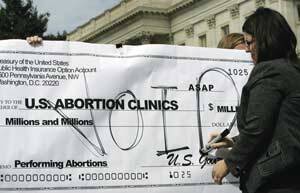A bipartisan bill before the House of Representatives would bring the new health care reform law “into line with policies on abortion and conscience rights that have long prevailed in other federal health programs,” said the head of the U.S. bishops’ Committee on Pro-Life Activities. In a letter on May 20 to House members, Cardinal Daniel N. DiNardo of Galveston-Houston urged passage of H.R. 5111, legislation proposed by two representatives, Joseph Pitts, a Pennsylvania Republican, and Dan Lipinski, Democrat of Illinois, and co-sponsored by 91 other House members. “Efforts to ensure that our health care system serves the life, health and conscience of all will be a legislative goal of the Catholic bishops in the months to come,” Cardinal DiNardo said, adding that the Pitts-Lipinski proposal makes “a significant contribution to this important task.”
The cardinal warned, however, that if “these genuine problems are not addressed in their own right, they will be taken up and used as ammunition by those who favor repealing [the health reform law] outright, which would eliminate the positive as well as negative aspects of the new law.”
In introducing the Protect Life Act on April 22, Pitts said that the legislation signed by President Obama lacked “critical safeguards” that had been approved earlier by the House. “The new health care law is riddled with loopholes that allow taxpayer subsidies for coverage that includes abortion,” he said. “My new bill would extend longstanding policy by preventing federal dollars from being used to pay for abortion coverage.”
Cardinal DiNardo said the Patient Protection and Affordable Care Act, signed into law on March 23, was “an important step toward ensuring access to health coverage for all Americans” but was “profoundly flawed in its treatment of abortion, conscience rights and fairness to immigrants.” He also said the executive order signed by President Obama on March 24 “does not address, or claim to address, several of the problems.”
Cardinal DiNardo said the Protect Life Act would ensure that all funds “authorized or appropriated” by the new health reform law would be covered by the Hyde Amendment, which limits federal funding of abortions to cases of rape, incest and danger to the mother’s life and would prevent the use of federal funds to subsidize health plans that cover abortions beyond those permitted by Hyde. Cardinal DiNardo said the bill restores a conscience provision approved by the House last November to ensure that federal, state and local governmental entities receiving federal funds may not discriminate against health care providers who decline to participate in abortions and stipulates that state laws restricting abortion or protecting conscience rights will not be pre-empted by the federal health reform law.
The U.S.C.C.B.’s in-terpretation of the reform act and the necessity of this attempt to address its purported shortcomings were challenged by the legal scholar Timothy Stoltzfus Jost. In an article on the Commonweal magazine Web site, Jost wrote: “From a pro-life The U.S.C.C.B.’s in-terpretation of the reform act and the necessity of this attempt to address its purported shortcomings were challenged by the legal scholar Timothy Stoltzfus Jost. In an article on the Commonweal magazine Web site, Jost wrote: “From a pro-life perspective, there is nothing objectionable in H.R. 5111, but the U.S.C.C.B. is wrong to claim that the bill is necessary to prevent federal funding of abortion and to ensure conscience protections in health reform. Under [the health care reform act], federal funds cannot be used to pay for abortion and the consciences of health-care providers are protected.”








